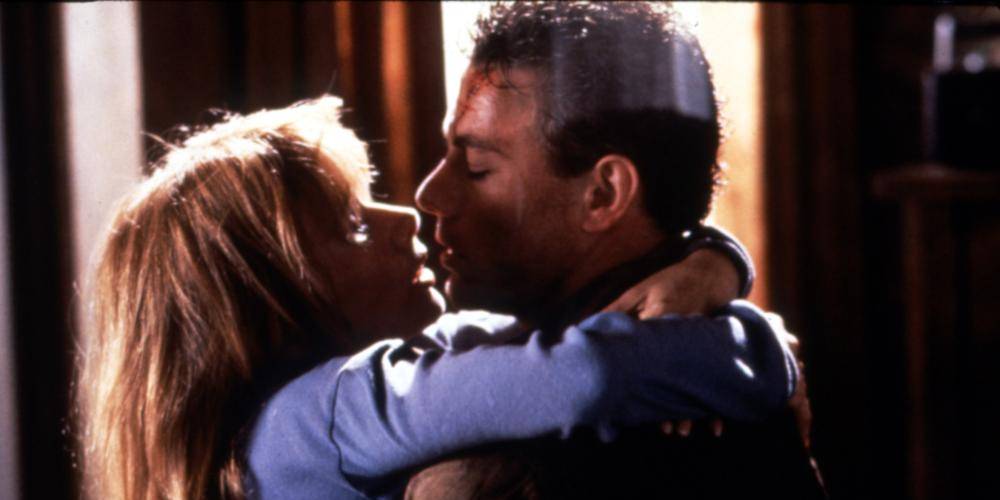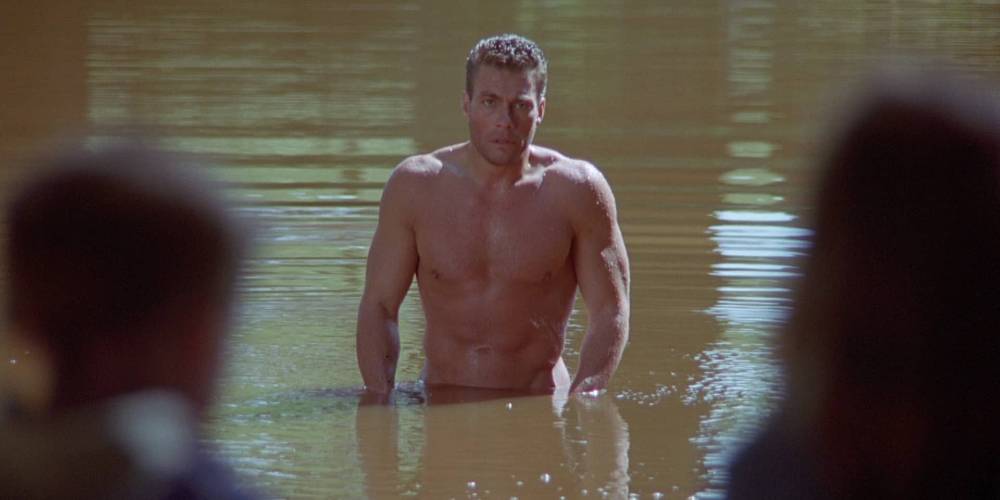Van Damme has made better films, but Robert Harmon’s 1993 action drama is perhaps the best encapsulation of what makes him a star.
Is there a more glorious sight in all of cinema than Jean-Claude Van Damme at his impossibly elastic, practically ethereal best, his lithe body slick with sweat as he crumples his opponent with a devastating spin kick or does the splits and uppercuts a dude right in the dick? In his prime, the Muscles from Brussels couldn’t be matched in terms of pure physical spectacle, standing out from—or perhaps floating serenely above—Hollywood’s other action superstars of the time, a compact outlier in an era of brutes and beefcakes. None of his peers—Stallone, Schwarzenegger, or even Lundgren—possessed that same balletic, Gordon Liu-Esque grace. Until Scott Adkins gets a legitimate shot at the big time, there’s nobody in the mainstream who’ll reach Van Damme’s heights in the foreseeable future.
For all Van Damme’s elegance, for me, it’s one of his earthier efforts that deserves to be spotlighted as the definitive, pitch-perfect Jean-Claude Van Damme vehicle—Nowhere to Run. Directed with workmanlike efficiency by Robert Harmon (conspicuously devoid of the stylistic bravura with which Harmon’s 1986 masterpiece The Hitcher is saturated) and humbly nestled within Van Damme’s stellar eighties and nineties catalog, the film isn’t particularly worthy of any significant re-evaluation as a whole. It mostly does what it’s supposed to do as a purely functional throwback to the classic Hollywood Western, the tale of a quiet stranger with a violent past arriving to protect a peaceful family from the encroaching evil of corrupt real estate developers.
Van Damme’s charisma might elude some, but if you’re tuned into his specific frequency, his magnetism becomes undeniable.
It’s what Van Damme does with that rudimentary framework that’s so special. He uses the film’s nakedness as a platform from which to parade the full, remarkably expansive range of qualities that make him such a distinctive, irresistible presence. Look at the Nowhere to Run’s opening set piece—in which Van Damme’s Sam Gillen, a convict with a heart of gold, is freed when the bus taking him to prison flips over. Forced to engage in a sandy skirmish, Van Damme seems at first to ditch his trademark footwork, swapping pirouettes for straightforward pugilism as he bludgeons and headbutts his way through a crowd of competing criminals before eventually reminding us of his aerial prowess by pulling off an exquisite, gazelle-like flying tackle through two car doors.
Standing at the intersection between streetwise brawler and cultured athlete, Van Damme brings the best of both worlds—silk and steel—with a display of versatility that serves as a microcosm of his performance in its totality. He boasts dramatic and bodily flexibility in one of the very few roles that encouraged him to tap into his thespian reservoirs. As the stoic, virtuous escaped con, he’s quietly multifaceted, convincingly sensitive as a mysterious protector and stilted but tender surrogate father figure whenever the film slows down and makes the wholesome family dynamic between Sam, terrorized landowner Clydie Anderson (Rosanna Arquette), and her son Mookie (Kieran Culkin) its central preoccupation.
For all his huge, earth-shattering striking ability, it’s the precision with which Van Damme pulls off the small tics and gestures here that really makes an impact.
The paternal material plays beautifully into Van Damme’s natural awkwardness—his singular, thoroughly endearing self-consciousness makes his interactions with Culkin feel genuinely tender, more so than any conventionally accomplished actor could. In Sam’s taciturn sweetness towards Mookie, there’s a real sense of a man experiencing a kind of relationship that’s totally new to him and somehow managing, through sheer instinct alone, to forge something unique and precious.
For all his vast, earth-shattering striking ability, it’s the precision with which Van Damme pulls off the small tics and gestures here that really makes an impact. There’s a wonderful moment at the Andersons’ breakfast table where Mookie cheekily asks Sam to pass him the salt shaker, an object he knows Sam had earlier stolen and then duly returned while still illegally hiding out on Clydie’s property. Van Damme’s little pause and roll of the eyes totally sell the sense of familial bonding, that second of knowing hesitation in which the in-joke is acknowledged and appreciated behind a deceptively unsmiling veil.

Van Damme’s mild disposition is ideal for the film’s romance, too, as Sam feels his way into Clydie’s affections with disarming tentativeness. Again, it’s the little things he does that stick, especially those slightly nervous glances with those glassy eyes as the two first size each other up, which then give way to wide, protracted gazes. It’s all very low-key and restrained, which isn’t to say there’s no sizzle or heat. In stark contrast to the utter sexlessness of the modern action star, Van Damme is an intensely sensual being, and plenty of his films are pretty indulgent when it comes to admiring his beauty—taking the time to ogle his sinewy, hunky physique, often directly through the ravenous eyes of his love interests.
Nowhere to Run is no exception, but where it separates itself from the rest is how it offers Van Damme a license to swoon himself. There’s some tangible, good old-fashioned yearning in those looks he gives Arquette—something, again, that’s tragically absent from so much of today’s sterilized action fare. There it is again as he watches the grainy, nostalgic home video footage of Clydie’s wedding, his eyes betraying his melancholy and longing. And is that a glimmer of jealousy that flashes across his face as he watches Clydie’s shithead sheriff boyfriend kiss her goodbye?

All of this is embellished with a varnish of impeccable swagger—Van Damme’s charisma might elude some, but if you’re tuned into his specific frequency, his magnetism becomes undeniable. He oozes that aura of cool that seems effortless, not in the obnoxious Seagalian god complex sort of way (Van Damme, like Jackie Chan, does his fair share of getting his shit kicked in), but in a way that makes you really feel the latent danger in his serenity. To watch him here, calmly facing off against the wonderfully menacing Ted Levine, trading muttered words of barely-contained aggression, is to witness the kind of old-school movie star confidence that the enervating, ever-quipping pretenders like Chris Pratt or Dwayne Johnson could only dream of boasting.
There are better Van Damme movies, certainly, and many other fantastic Van Damme performances: for the purest expression of the actor’s martial arts mastery, John Woo’s masterpiece Hard Target can’t be topped; for classic nineties action star muscular mayhem, Peter Hyams’ Sudden Death is a more relentless riot; and if you’ve ever wanted to see Van Damme doing buddy movie things with Dennis Rodman against a backdrop of absurd storytelling and stylistic experimentation, then Tsui Hark’s Double Team is more the movie for you. But in a filmography with such exhilarating peaks, Nowhere to Run holds its own—a diminutive, agile little bantamweight, kicking way above its class thanks to that precious, coruscating sprinkle of Belgian star power, which arguably never sparkled brighter.
Nowhere to Run Trailer:
Read next: The Spool's Best New Releases
Streaming guides
The Best Live TV Streaming Services With Free Trial
The praises of live TV streaming services don’t need to be further sung. By now, we all know that compared to clunky, commitment-heavy cable, live TV is cheaper and much easier to manage. But just in case you’re still on the fence about jumping over to the other side, or if you’re just unhappy with ... The Best Live TV Streaming Services With Free Trial
How to Watch Power Book III: Raising Kanan Season 3
Season 3 of the hotly anticipated Power spin-off, Power Book III: Raising Kanan, is arriving on Starz soon, so you know what that means: it’s the ’90s again in The Southside, and we’re back with the Thomas family as they navigate the ins and outs of the criminal underworld they’re helping build. Mekai Curtis is ... How to Watch Power Book III: Raising Kanan Season 3
How to Watch Doctor Who: 60th Anniversary Specials
Ladies and gentlemen, we’re so back! To celebrate Doctor Who’s 60th anniversary, the BBC is producing a three-episode special starring none other than the Tenth/Fourteenth Doctor himself, David Tennant. And to the supreme delight of fans (that would be me, dear reader), the Doctor will be joined by old-time companion Donna Noble (Catherine Tate) and ... How to Watch Doctor Who: 60th Anniversary Specials
Which Netflix Country has Interstellar?
Maybe you’ve just seen Oppenheimer and have the strongest urge to marathon—or more fun yet, rank!—all of Christopher Nolan’s films. Or maybe you’re one of the few who haven’t seen Interstellar yet. If you are, then you should change that immediately; the dystopian epic is one of Nolan’s best, and with that incredible twist in ... Which Netflix Country has Interstellar?
Which Netflix Country Has Each Movie of The Hunger Games?
For whatever reason, The Hunger Games series isn’t available in the same countries around the world. You’ll find the first and second (aka the best) installments in Hong Kong, for instance, but not the third and fourth. It’s a frustrating dilemma, especially if you don’t even have a single entry in your region, which is ... Which Netflix Country Has Each Movie of The Hunger Games?
How to Watch ESPN With A Free Trial
One of the major concerns people have before cutting the cord is potentially losing access to live sports. But the great thing about live TV streaming services is that you never lose that access. Minus the contracts and complications of cable, these streaming services connect you to a host of live channels, including ESPN. So ... How to Watch ESPN With A Free Trial
How to Watch Paramount Network With a Free Trial
To date, Paramount Network has only two original shows on air right now: Yellowstone and Bar Rescue. The network seems to have its hands full with on-demand streaming service Paramount+, which is constantly stacked with a fresh supply of new shows. But Yellowstone and Bar Rescue are so sturdy and expansive that the network doesn’t ... How to Watch Paramount Network With a Free Trial
How to Watch WE TV With a Free Trial
Previously “Women’s Entertainment,” We TV has since rebranded to accurately reflect its name and be a more inclusive lifestyle channel. It’s home to addictive reality gems like Bold and Bougie, Bridezillas, Marriage Boot Camp, and The Untold Stories of Hip Hop. And when it’s not airing original titles, it has on syndicated shows like 9-1-1, ... How to Watch WE TV With a Free Trial
How to Watch Comedy Central With a Free Trial
It’s no coincidence that many of today’s biggest comedians found their footing on Comedy Central: the channel is a bastion of emerging comic talents. It served as a playground for people like Nathan Fielder (Fielder For You), Ilana Glazer and Abbi Jacobson (Broad City), Tim Robinson (Detroiters), and Dave Chappelle (Chappelle’s Show) before they shot ... How to Watch Comedy Central With a Free Trial
How to Watch FX With a Free Trial
You’d be hard-pressed to find a bad show airing on FX. The channel has made a name for itself as a bastion of high-brow TV, along with HBO and AMC. It’s produced shows like Atlanta, Fargo, The Americans, Archer, and more recently, Shogun. But because it’s owned by Disney, it still airs several blockbusters in ... How to Watch FX With a Free Trial
How to Watch TNT Sports With A Free Trial
For many sports fans, TNT is a non-negotiable. It broadcasts NBA, MLB, NHL, college basketball, and All Elite Wrestling matches. And, as a bonus, it also has reruns of shows like Supernatural, Charmed, and NCIS, as well as films like The Avengers, Dune, and Justice League. But while TNT used to be a cable staple, ... How to Watch TNT Sports With A Free Trial